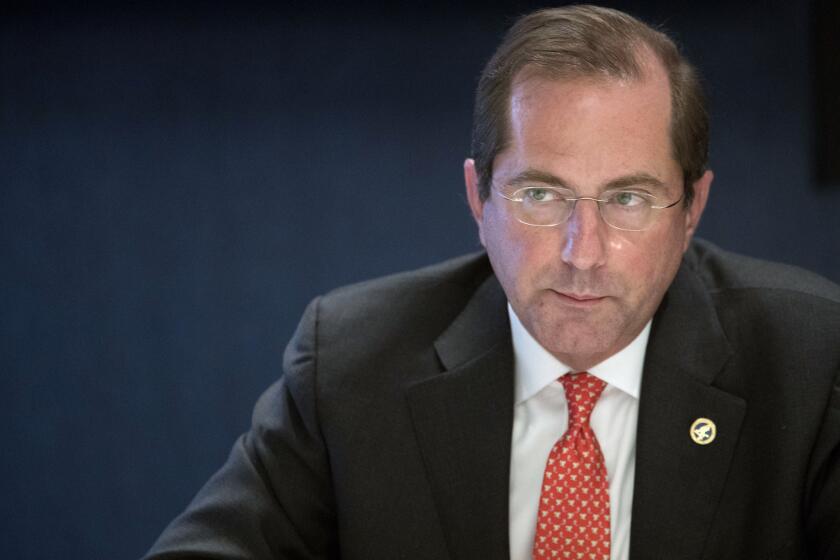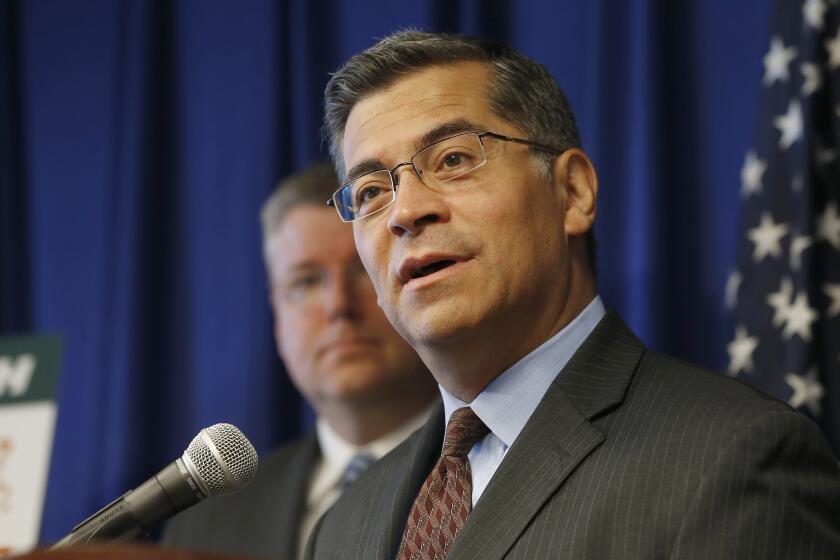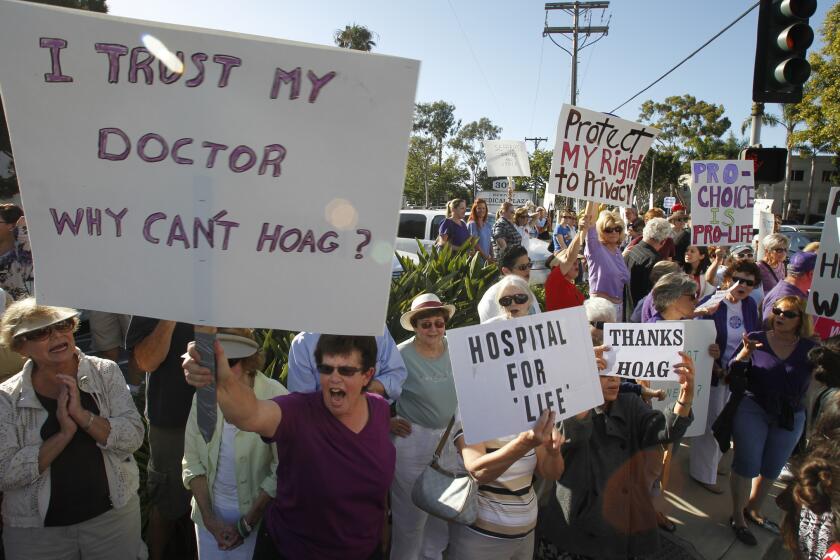Column: UC misses a chance to fix its anti-abortion deals with Catholic hospitals
- Share via
The University of California had an excellent opportunity to establish the terms of its affiliations with Catholic hospitals, seizing back its authority to deliver science-based medical care from those who would restrict it on religious grounds.
The university blew it.
On Tuesday, the report of a 15-member working group drawn mostly from UC executives and faculty members was released and opened for comment through Feb. 21.
California, uniquely, for decades has had the rights of women, including reproductive healthcare, carved into the state constitution.
— Michele Goodwin, UC Irvine bioethicist
Its goal, as described by UC President Janet Napolitano, was to develop recommendations to “ensure UC’s values are upheld when its academic health systems collaborate with other health systems” and “that UC personnel will remain free, without restriction, to advise patients about all treatment options and that patients will have access to comprehensive services.”
The group failed in its task of coming up with a single set of recommendations that all its members could endorse. The reason, according to UC Irvine Chancellor Howard Gillman, its chair, is that the members disagreed on the fundamental issues: Should UC affiliate at all with organizations that prohibit “contraception, abortion, assisted reproductive technology, gender-affirming care for transgender people ... the full range of end-of-life options”? And should it partner with institutions that allow non-professionals to interfere with healthcare providers’ professional judgments and patients’ informed decisions?
To ask these questions is to answer them, and the answer in both cases plainly is no.
Any affiliations entered into by a publicly funded system that allow religious considerations to outweigh scientific and medical judgments are improper — and according to the state constitution and statutes, quite possibly illegal.
Instead of reaching an agreement, the working group splintered. It ended up submitting two options for the UC administration and regents to choose from: Option 1, favored by those who think the university should find a way to collaborate with religious healthcare institutions, and Option 2, which explicitly places UC’s nondiscriminatory values above any and all religious restrictions. More on those in a moment.
The University of California regents are wrestling with a question that should have an easy answer: Should they approve an “affiliation” between UC San Francisco, one of the leading teaching hospitals in America, and Dignity Health, a Catholic hospital chain that openly discriminates against women and LGBTQ patients and requires its doctors to comply with religious directives, some of which run counter to medical science and ethical practice?
Although the working group’s goal was to craft rules for affiliations with any religious facilities, in practical terms the issue is Catholic hospitals. That’s because the Catholic Church’s rules on health services are among the most restrictive of any religious group, and because Catholic hospitals play an increasingly large role in American healthcare, currently accounting for one out of every six beds in the nation.
Since many of the restrictions deal with reproductive and gender-related rights, they fall most heavily on women and LGBTQ patients.
The working group was created by Napolitano after last year’s blowup over a plan crafted by UC San Francisco, the system’s leading medical school and medical center, to expand an existing affiliation with Dignity Health, a major Catholic hospital chain. Its failure to come up with a single workable plan leaves Napolitano in a quandary; she will have to present a model for affiliations with religious institutions to the regents at some point, probably this spring.
At the moment, UC has been working to revise language in its existing contracts with Dignity, but the progress of that effort is unclear. Under interim guidelines issued in August, new and renewed contracts are supposed to run for no longer than a year, include 90-day termination clauses, and be free of requirements that UC personnel honor or enforce religious directives.
Dignity’s hospitals are subject either to the Catholic Church’s Ethical and Religious Directives for Catholic Health Care Services, which are written by a committee of bishops and dictate the restrictions mentioned by Gillman, or the marginally less restrictive Statement of Common Values.
In essence, the arrangement produced a conflict between the Catholic directives and UC’s rules and state law, which bar any discrimination based on sex (among other standards) and forbid the university from any religious influence.
UC San Francisco announced Tuesday that it is dropping plans for an expanded affiliation with Dignity Health, a Catholic hospital chain that places flagrantly discriminatory restrictions on abortions, transgender care and other services.
UCSF was prepared to subject its professionals and students, however, to the dictates of the ERDs, which are “unequivocal, explicit, and hard to miss,” noted Michele Goodwin, a UCI law professor and the only bioethicist on the working group, in a blistering critique of UC contracts with Catholic hospitals appended to the working group report.
The proposed affiliation created an uproar at UCSF, where many faculty decried the idea of subjecting UC professionals, patients and services to religious strictures, and before the Board of Regents. UCSF eventually abandoned its proposal. But several members of the working group saw its deliberations as aimed at finding a way to revive the deal.
A crisis in UC healthcare autonomy is already upon us, thanks to UC leadership. Many existing contracts between UC and Catholic hospitals, the working group report acknowledged, require UC personnel to adhere to the ERDs or Statement of Common Values.
The language of those contracts “prohibits UC personnel from delivering some types of care and performing certain procedures at non-UC facilities guided by their own personal judgment and the informed decision of the patient.” At least one recently expired contract at UCI even bound medical students to the restrictions when they were in training at Catholic institutions.
UC health officials say their ability to affiliate with Catholic hospitals is imperative, chiefly because the system’s ability to treat patients is limited by “capacity and geography.” In some parts of the state, they say, Catholic hospitals are the only alternative to overstretched UC facilities.
Declaring that President Trump’s rationale for his antiabortion “conscience” rule had no basis in fact, a judge throws it out.
The report asserts that these deals “expand and improve the care” patients receive “in ways that otherwise would not exist in their communities.” But it skates over the fact that care could be reduced or degraded for patients because religious rules interfere with their receiving the treatments their doctors consider appropriate.
The very idea that UC would accept in any form the imposition of religious doctrine on its professional practice or training is appalling, given how patients’ rights to equal access to treatments are coming under increasing challenge from the religious right.
California and UC have been in the forefront of the fight against these encroachments. California Atty. Gen. Xavier Becerra last year helped win a court ruling blocking the Trump administration’s “healthcare refusal rule,” which would have allowed almost anyone, even ambulance drivers and front desk receptionists, to interfere with care because of their religious or moral scruples. The rule was cast as a safeguard for religious practices, but in fact its chief goal was to clear the way for healthcare providers to refuse to perform abortions, even in emergencies.
Just a few days ago, Trump fired another shot at California’s healthcare standards by threatening to withhold federal funding from the state if it does not stop requiring health insurance plans in the state to provide abortion coverage. The administration gave the state 30 days to repeal the mandate, which is based in part on a right to privacy enshrined in the state constitution.
What’s at stake in the UC debate is more than its relationship with Dignity Health or any other religious institution. “California, uniquely, for decades has had the rights of women, including reproductive healthcare, carved into the state constitution,” Goodwin says. “This shouldn’t be a conversation just about Dignity, but about our commitments to making sure that we uphold these important values that flow from our university system right on up through the state and its constitution.”
That undermines arguments based on expediency — that in order to alleviate UC’s capacity problems, the healthcare rights of women and LGBT patients should be made secondary.
Concerns about religious restrictions on care helped to block a big hospital merger in California.
Those arguments, Goodwin suggests, “keep us from making the case to the regents and the Legislature and the governor for better funding for our medical centers and our hospitals, or from thinking about collaborations that don’t force us to contort ourselves to fit principles and values inconsistent with our own.”
The working group established by UC seemed heavily weighted toward approving the UCSF deal and those that other campuses have reached with religious healthcare institutions. Of its 15 members, 10 were officials of the UC administration or UC campuses who had expressed support for the UCSF arrangement, oversaw deals with Catholic hospital systems or have an institutional interest in making further arrangements. Four were explicitly critical of such arrangements. Gillman took no explicit stand. He declined to be interviewed for this column. The panel included no one from outside UC.
The four dissenting members declined to endorse the final report.
“There are no significant differences in what UC Health is currently proposing compared with their plans prior to the [working group] deliberations,” wrote working group members Kum-Kum Bhavnani, a UC Santa Barbara sociologist and chair of the UC Systemwide Senate; Vanessa Jacoby, a UCSF associate professor of obstetrics, gynecology and reproductive sciences; and Robert C. May, a professor of philosophy and linguistics at UC Davis, in a letter also appended to the report.
In their view, Option 1 is designed to paper over the true impact of the religious directives on professional autonomy and the wishes and needs of patients.
“The language [in Option 1] is aimed to appease public scrutiny and avoid a public outcry from advocates for reproductive rights and LGBT people,” Jacoby told me. “In fact, the language is nuanced to ally with the Religious Directives.”
Rebecca Chamorro, 33, is a married woman who is due to give birth to her third child by C-section on Jan. 28.
Option 1, Jacoby points out, requires that agreements with religious institutions provide that UC personnel and students working at their clinical sites be permitted to “make clinical decisions consistent with ... their independent professional judgment ... inform patients of all of their healthcare options ...[and] prescribe any interventions that are medically necessary and appropriate.”
A lot is unsaid in those phrases, Jacoby observes — and that’s where the problems lie. “Being able to ‘prescribe any interventions,’ to a reasonable person sounds very appropriate,” she says, “but it’s completely inadequate in the care of women and LGBT people.”
The reason is that many procedures for those patients aren’t “prescriptions,” in the sense of something that can be acquired at a pharmacy and self-administered, but require clinical procedures. “You can prescribe an IUD or [contraceptive] implant or tubal ligation,” Jacoby says. “They have to be delivered in a hospital or a clinic.” That can’t be done in a hospital subject to the Catholic directives.
By some reckonings, the Catholic directives are so deeply embedded in the operation of Catholic hospitals that they pose an insurmountable obstacle to UC affiliations with those facilities.
“It’s problematic to believe that [UC personnel] would be free to practice medicine in the way that UC says it supports; that’s simply not the case in Catholic hospitals,” says Phyllida Burlingame of the ACLU of Northern California, which has brought lawsuits against Dignity Health for denying services to patients on religious grounds. “There’s a fundamental difference in terms of what guides medical practice. At UC, they say it’s discrimination-free, evidence-based medicine. In Catholic hospitals, it’s Catholic religious directives.”
Dignity Health has consistently defended its affiliations with UC. Last November, the system observed that similar partnerships are “common across the country and are a key way to offer access to a full range of healthcare.” The system added that “Dignity Health and UC have always expected any physician practicing at a Dignity Health location to discuss all treatment options, prescribe appropriate medications, and facilitate access to another provider if a Dignity Health location does not provide a desired service.”
Jacoby and the other dissenters say in their letter that they proposed that UC agreements with Catholic hospitals “expressly state that ‘UC personnel or trainees will not need to abide by religious directives.’” (Emphasis theirs.) UC Health officials objected. The language is included in the working group’s Option 2.
They also noted that although UC health leadership has asserted that UC personnel are empowered to “make clinical decisions” based on their own professional judgment, UC Health objected to adding language to contracts explicitly giving UC personnel the power not only to make decisions, but “provide services and perform procedures consistent with the standard of care and their independent judgment.”
Without that language, they say, the guarantee of independent clinical decisions is riddled with loopholes. “Making clinical decisions is only one small part of caring for patients,” Jacoby told me. “I also have to be able to perform procedures and deliver services. Clinical decisions are just my thoughts of what the right thing is to do. If I’m prohibited from carrying out the right thing, then I can’t care for my patients and it’s not practicing medicine.”
More to Read
Inside the business of entertainment
The Wide Shot brings you news, analysis and insights on everything from streaming wars to production — and what it all means for the future.
You may occasionally receive promotional content from the Los Angeles Times.














